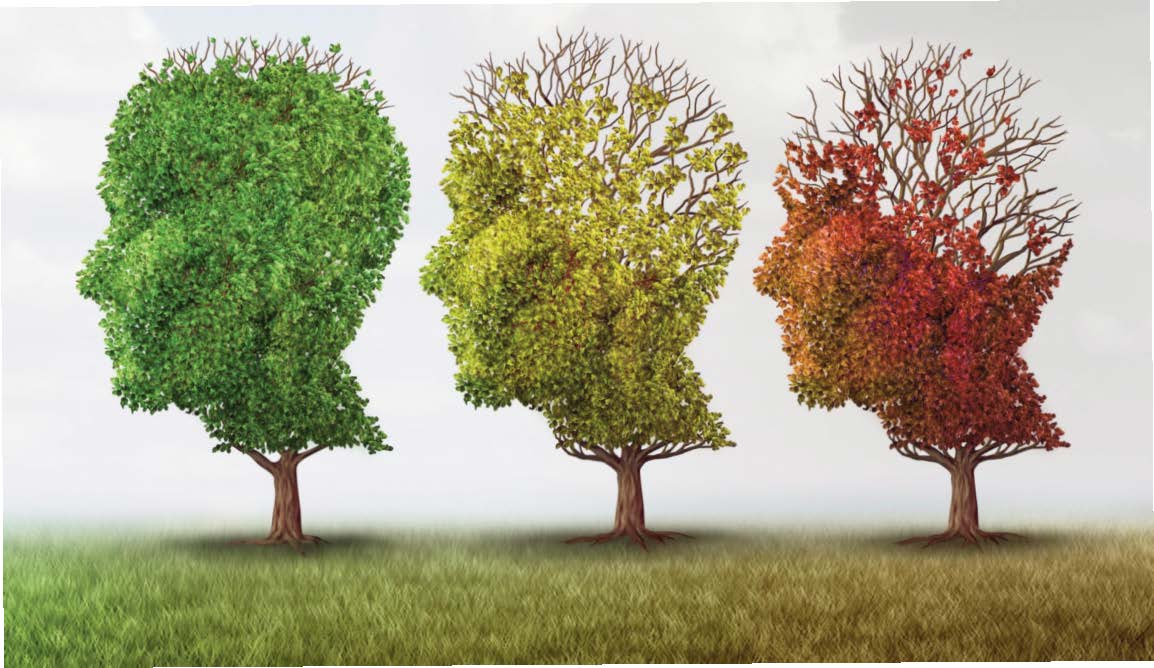DEFINING NEURODEGENERATIVE DISEASES
BY ANDREW KOCH
This article explores caregiving for person/s with neurodegenerative disease/s (PWND). The focus is on the family caregiver's experience before, during, and after the caregiving journey ends.
Neurodegeneration refers to the altering, minimization, destruction of, or unspecified degradation of neurons. Typically, paths of neurodegeneration occur in either the brain, brainstem, and/or in the peripheral nervous system. Depending on which types of neurons are affected by disease process, the corresponding function is impaired. Neurodegenerative diseases (NDs) can be broken into two rough categories: dementia and motor neuron diseases (MNDs). The diagnosis of any disease is based primarily on symptoms. So, ask, "What were the first symptoms?" Diseases affecting the mind are most likely labeled dementia. Common areas altered are: cognition, emotional expression, orientation with time and place, and personality. Whereas, disease influencing movement and the body are often labeled as motor neuron diseases.
There is often overlap between symptoms and both the mind and body are impacted by the disease process. Uncertainty, fear, survival mode, confusion, anger, sadness, are few of the cyclical emotions a person with NDs may experience on a daily basis. Whether it is the chronic memory loss of dementia, or the gradual loss of mobility within a motor neuron disease, two things are true: the disease is shaped by the person and the disease shapes the person. Each person is unique, gifted, and blessed with specific talents, abilities, interests, memories, and mementos. Each disease has its specific strains, progression, and finality.
At the intersection of who a person is and the diagnosis they receive, is a brilliant sanity. This brilliant sanity is an opportunity to find the shimmering spark of humanity discovered at the core of every being. Brilliant sanity is the choice to honor, accept, make friends with, and fully embrace the person you love regardless of diagnosis. Brilliant sanity is being with non-movement, loss, grief, confusion, hallucinations, and word salads with openness, curiosity, and compassion. In this article we will make use of two theoretical frameworks. The first is the Transpersonal framework that validates and integrates a person's phenomenological, religious, existential, spiritual, and transpersonal experiences and identities, as well as other and altered states of consciousness, such as a psychosis or disease and drug- induced states. This holistic approach makes space for the one being cared for to express themselves authentically and finds value in the brilliant sanity of the "downward staircase" of a progressive disease. Each hallucination can be treated with an attitude of receptivity and interest. Instead of labeling repetitive or unintelligible speech as "disruptive" or a "behavior," reframe this as a healthy attempt to communicate a core need. The person who is often "medicated" by anti-psychotics may be approached with humility, gentleness, and a desire to uplift and understand, rather than suppression and rejection. Reality orientation is the forceful effort by caregivers to orient someone with a non-ordinary state of consciousness to time and place, whereas reality validation is going with their flow and joining them with a willing suspension of disbelief. The consistent trial and error of reality orientation is exhausting and, quite frankly, invalidating to the lived, embodied experience of another. The transpersonal perspective evaluates and infuses personalized care that honors the intrapsychic, interpersonal, cultural, and collective experiences of personhood and fiercely advocates for them when oppression is ideological, institutional, interpersonal, or internalized.
The second theoretical framework is The Caregiving Years Model (CYM) developed by Denise Brown in 1997 as a direct response to the question, "What would happen when we listened to the family caregiver?" (Brown 2008). After years of intentional effort and dedication, six stages were formed that bookmarked each chapter of the caregiver's journey when supporting a loved one. The six stages are Expectant, Freshman, Entrenched, Pragmatic, Transitioning, and Godspeed. For simplicity, let's combine Expectant and Freshman into Before Caregiving Begins, Entrenched and Pragmatic into During Caregiving, and Transitioning and Godspeed into After Caregiving Ends.
BEFORE CAREGIVING BEGINS
Expectant: Stepping into Uncertainty By Asking Questions. Let's assume your loved one has not yet received a diagnosis. Let's go back before the symptoms started. What systems of support do you have? What is your current relationship with this loved one? Does your loved one have a healthcare and financial power of attorney (POA)? Who are your loved one's current healthcare providers? A series of questions begins, stepping into uncertainty by asking tough questions now ensures we gain vital information that prepares us for the future of caregiving. How do you want to live? If you lose your body, how do you want to be moved? If you lose your mind, what will remind you of your true self? What music makes your heart sing? The caregiver becomes the detective, discovering all the essential knowledge of the person they love and support. The caregiver honors themselves and commits to selfcare now, not later, and reflects upon the answers to the questions to provide guidance when the road becomes rocky. Be bold. Be brave.
Freshman: Brace for Impact by Finding Answers Life is different now. The onset could be unexpected, sudden or subtle. Regardless of when and how you found out about the symptoms or diagnosis, life is different now. The time for hypotheticals is over and it is now time to become involved more deeply with your loved one's life. You are going to continue to ask questions, in fact you will become quite the sleuth as you begin to find out solutions that work for you and your loved one. What do I know about this disease? How am I going to cope with the stress? How will I keep track of everything? What community services can assist me? By finding and utilizing national family caregiver training programs, local non-profit-led, and online education will help you brace for the impact of hands-on caregiving.
As your new role comes into fruition, the budding experience of the person with a diagnosis can be traumatic and, for the entire family, life changing. Consider the triathlete who learns they can no longer bike, run, or swim alone. Empathize with the former teacher, librarian, or electrician who can no longer trust their brain to accurately translate reality to them. The freshman stage is brutal. Normal responses include denial, aggression, avoidance, depression, and a hesitance to welcome the changes. These normal responses keep us from feeling the pain in the short term, but longer term leads to burnout and staying in the hurt. Denial is especially insidious in the early stages when a diagnosis is not clear. Depending on the nature of how a disease progresses, the caregiver or loved one may find themselves in the land denial often that rises, plateaus, and falls.
Your mission, should you accept it, is to adapt, improvise, and overcome, to find out what works and what doesn't, to find humor and play in profound and mundane moments. From the long-distance caregiver ordering meals and a weekly shopping list from 3,000 miles away, to helping clean both their parent and child's poopy Picasso finger paintings off the walls, life is different now for the caregiver. Create a journal for yourself and one for your loved one. There is an important adage, "If it wasn't documented, it didn't happen." The journal will help keep you sane and be a powerful testimony to the nitpicky bunch who will invalidate your good work as a family caregiver (there are many). Your ability to play and experiment will become crucial as the progressive nature of the disease consistently challenges the status quo and your relationship with your loved one.

DURING CAREGIVING
Entrenched: Frustration and Burnout. "The more limited one's capabilities for contact, the more one's experience of self and of the environment becomes fragmentary, disorganized, and subject to resistance." (James, 1993). When are you celebrating your good work? From whom are you receiving support? What has changed since diagnosis? Where do you go to recharge your batteries? How do you stay current with the changing care needs? More questions, some new with each new month, some old. Maybe you've mastered the art of handwashing, scheduling, or bed-baths. Maybe you were thrust into a fulltime job of caring for your loved one, having to give up your career in the process. Millions of maybes later, here you are, in the trenches, mud on your feet, grit in your teeth, a smile, a soft heart, and a strong back.
All your hard work and effort is an investment. Keep going. You are doing great! At this stage, your voice becomes loud and clear as you begin to identify what's mine, that is, my baggage and agenda and what's theirs, your loved one's baggage and agenda. Frustration and burnout are common and occur no matter how resilient or level-headed you may have been before caregiving began. Things are different, remember? Keep journaling, honoring your limits, and create a system that works for you. Truly invest in finding a support system. Let yourself say no. Stay in contact with your true self and watch the evolution of willpower.
Pragmatic: Harmony and Synergy You have set healthy boundaries, you know what doesn't work and have a gut sense of what does, even if your loved one can no longer speak for himself or herself. Your loved one is different now too. At this stage in the journey, your goal is to become familiar with the beauty of change and the intimate relationship, the special bond you share with the person you are caring for. Both of you have swallowed your pride, you move together in stride. There may have been falls, sometimes three in one week, but falls are no longer the trigger for distressful panic. A fall now causes a vigilant, thoughtful reaction, rather than a frantic response. Take time now, to slow down and reflect on the moments of chaos and stress and how you adapted, improvised, and overcame each of those challenges. Just as you received support when you were neck-deep, so too you continue to rely on others. You fill your cup and it runs over. You already know you will be spending a great deal of time with your loved one. How will you find time for shared activities that you both enjoy? When you have your regularly scheduled breaks (and you deserve and need them), what will you do? The sky is the limit, and your local communities often have resources to help you thrive. Explore offerings from local senior services, colleges, and libraries. Share your heartache and your insights in a forum or on social media; express yourself.
Being pragmatic means using both technology and the resources available to you to move from surviving into thriving. Despite obstacles, there are always ways to adapt to the changing needs of a loved one. Installing do-it-yourself lifts, ramps, and elevators takes courage and faith. Yet, the resulting independence can turn five years of agony and degeneration into five years of play, exploration, experiments, projects, and proactive adaptation. Throw out the throw rugs, get used to the naked body, and laugh every chance you can. This is hard work. You are not alone!

AFTER CAREGIVING ENDS
Transitioning: The End Is the Beginning. You have come a long way. The journey has tested your wit, strength, and your flexibility. You have scars, some may be visible, but most are hidden. You have carried the burden and now you sense the end is coming near. What do you struggle with? How do you feel about the good work you have done? When was the last time you read the hero's tale told by your journals and busy schedule? You have done so much for your loved one. Reflect on what you have done. Allow yourself to scream and shout, eat the ice cream, cry inconsolably, grieve, mourn, and honor your loved one. The final moments are not like the rest of the journey. A slowing down occurs. In the end, we see the person as a precious gem in the rugged shell of a diseased body. We find beauty in frailty, we cherish gentleness. We choose brilliant sanity.
The end marks the beginning. We can soften or harden ourselves. If we harden ourselves, we become brittle. Remain soft. Allow forgiveness and welcome your changing emotions. Each emotion is a messenger that gifts you with a potent truth about the internal experience. Trust your emotions, ride their wave for ninety seconds. See if they still have their grip, if so, ride another wave. Eventually, you will have learned to surf. No matter how high the waters rise you will not drown. Trust yourself, trust the process, seek out hospice when it is time. Keep asking the tough questions. What is a good death? How can I live now, without regrets? When can I create memories? What do I need to ask before it's too late?
Godspeed: Dare to Live At the end our loved one's life, a new journey begins. Life beyond caregiving. It doesn't end at the moment of death, it continues. The form changes, our function changes. We shift from doing into being. Now we are sorer, wiser, and absent our loved one. They live with us in our muscles, in our heart, in our minds. Ponder and contemplate your role as a caregiver and ask, who have I become? How will I follow my dreams?The lessons you learned are valuable. When will you share your story? Dare to live.

ABOUT THE AUTHOR:
He talks a lot and smiles often. He listens deeply. He prefers he/him/his, and you can call him Andrew. Andrew Koch has been caregiving professionally for eight years and cares for his uncles and one of his grandmas, longdistance from Boulder, Colorado where he is a Registered Psychotherapist and Owner of Contemplative Caregiver. He pursues a Master of Arts in Clinical Mental Health specializing in Mindfulness-Based Transpersonal Counseling. As a freshman family caregiver, Andrew is asking questions and finding answers within, cultivating loving-kindness for himself so that he may support those he cares for, spread compassion to the healthcare system and be the change that he wants to see in the world.
References Brown, D. M. (2009). The caregiving years: Six stages to a meaningful journey. Tad Pub. Brown, D. M. (2015). The caregiving years tip sheets. Tad Pub. Kepner, James. (1993). Mobilization and Body Process (pp. 120 –128). In Body Process: Working with the Body in Psychotherapy. SF: Jossey – Bass.